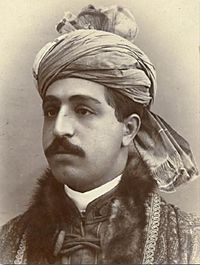Ayub Khan (Emir of Afghanistan) facts for kids
Quick facts for kids Mohammad Ayub Khan |
|||||
|---|---|---|---|---|---|
| Emir of Afghanistan | |||||

Ghazi Mohammad Ayub Khan
|
|||||
| Emir of Afghanistan | |||||
| Reign | 12 October 1879 – 31 May 1880 | ||||
| Predecessor | Mohammad Yaqub Khan | ||||
| Successor | Abdur Rahman Khan | ||||
| Born | 1857 Kabul, Afghanistan |
||||
| Died | 7 April 1914 (aged 56–57) Lahore, British India |
||||
| Burial | 1914 Peshawar, British India |
||||
|
|||||
| Dynasty | Barakzai dynasty | ||||
| Father | Sher Ali Khan | ||||
| Mother | Momand | ||||
Ghazi Mohammad Ayub Khan (Persian: غازی محمد ایوب خان) (Pashto: غازي محمد ايوب خان) (1857 – 7 April 1914) was an important leader in Afghanistan. People also called him The Victor of Maiwand or The Afghan Prince Charlie. For a time, he was the governor of Herat Province. He also served as the Emir (ruler) of Afghanistan from October 1879 to May 1880.
Ayub Khan led Afghan soldiers during the Second Anglo-Afghan War. He famously defeated the British Indian Army at the Battle of Maiwand. After a later defeat at the Battle of Kandahar, he was removed from power. He then lived in Persia (modern-day Iran) for a while. Later, he moved to British India and lived there until he died in 1914. In Afghanistan, many people remember him as a "National Hero."
Contents
Early Life
Mohammad Ayub Khan was born in 1857 in Kabul, Afghanistan. His father was Sher Ali Khan, who was also an Emir of Afghanistan. His mother was the daughter of a powerful chief from the Mohmand tribe. Ayub Khan had a brother named Mohammad Yaqub Khan.
The Second Anglo-Afghan War
Ayub Khan played a big part in the Second Anglo-Afghan War. His most famous victory was at the Battle of Maiwand in 1880. This was a major defeat for the British Indian Army. After this victory, he tried to capture the city of Kandahar. However, the British forces there were well-equipped.
On September 1, 1880, Ayub Khan's forces were defeated. This happened at the Battle of Kandahar. The British forces were led by General Frederick Roberts. This battle marked the end of the Second Anglo-Afghan War.
Life After the War
About a year after the war, Ayub Khan tried again to take Kandahar. This time, he was fighting against Abdur Rahman Khan, who was the new Amir of Afghanistan. But Ayub Khan was not successful.
He then went to Persia, which is now Iran. In 1888, he had talks with Sir Mortimer Durand. Durand was the British ambassador in Tehran. After these talks, Ayub Khan became a "pensioner" of the British Raj. This meant the British government gave him money to live on.
He traveled to British India in 1888. A British officer, William Evans-Gordon, helped him settle there. Ayub Khan lived in India until his death in 1914.
Death and Legacy
Mohammad Ayub Khan died in Lahore in 1914. He was buried in Peshawar, near the shrine of Sheikh Habib.
In Afghanistan, he is still known as the "National Hero of Afghanistan." He had a large family, including eleven wives, fifteen sons, and ten daughters.
Sardar Hissam Mahmud el-Effendi
One of Ayub Khan's grandsons was Sardar Hissam Mahmud el-Effendi. He was the son of Ayub Khan's first son, Sardar Muhammad Abdul Qadir Khan el-Effendi. Hissam Mahmud el-Effendi studied at a military college in British India.
He became a soldier in the British Indian Army in 1939. He fought in World War II, including in North Africa and the Burma Campaign. He was even captured once but managed to escape. After Pakistan became independent, he joined the Pakistan Army. He became a high-ranking officer, a Brigadier.
After leaving the army, he became a famous polo player. He helped organize polo games in Pakistan for over twenty years. He died in 1983 in Lahore. His son, Sardar Azmarai Javaid Hissam el-Effendi, also became a professional polo player and coach.
 | Sharif Bey |
 | Hale Woodruff |
 | Richmond Barthé |
 | Purvis Young |

